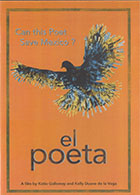
El Poeta 2015
Distributed by Bullfrog Films, PO Box 149, Oley, PA 19547; 800-543-FROG (3764)
Produced by Nefertiti Kelley Farias
Directed by Katie Galloway and Kelly Duane de la Vega
DVD, color, 55 min., English and Spanish with English subtitles
High School - General Adult
History, Literature, Mexico, Political Science, Spanish
Date Entered: 10/05/2016
Reviewed by Linda Kelly Alkana, Department of History, California State University Long BeachThe cost of the War on Drugs in the United States and Mexico is phenomenal and includes high rates of death and incarceration in both countries as well as corruption, cartels and chaos. Since 2006 more than 100,000 people have been murdered or disappeared in Mexico, many of them innocent civilians in this drug war.
El Poeta personalizes the brutality and omnipresence of this conflict as it tells the story of renowned Mexican poet Javier Sicilia who switched from poetry to activism when his 24-year-old son became a victim of the War on Drug-fueled conflict. The film captures the support the people of Mexico give Sicilia as he leads a march, first to Mexico City where he challenges President Calderón to stop the war, then North to Juarez, the hardest hit area. El Poeta shows the thousands of people who carry pictures of their missing and dead loved ones as they follow Sicilia, many of them joining his caravan. The contrast with Sicilia’s reception in the United States during his journeys there is striking. No English language press covers his story; nevertheless, Mexicans in the US greet him with more pictures of their lost ones and support for his message of peace. The film discusses the links between Sicilia’s activism and the history of civil rights activism in the US, showing the poet’s meeting with such honored civil rights veterans as John Lewis and Dolores Huerta.
In his last poem, Sicilia writes: “There is nothing else to say/The world is not worthy of the word.” Nonetheless, the film, itself, through its use of images and words does say something. It quotes a Mexican proverb: “They tried to bury us. They did not know we were seeds,” and is dedicated to the 43 students of Ayotzinapa who are still missing.
The production value, occasional use of interviews and graphics of El Poeta are effective.